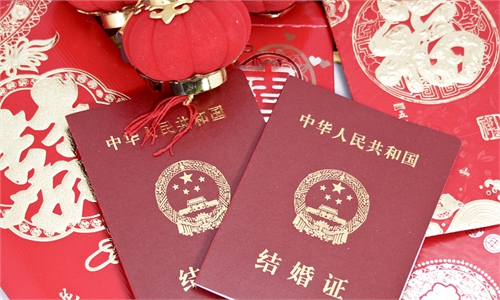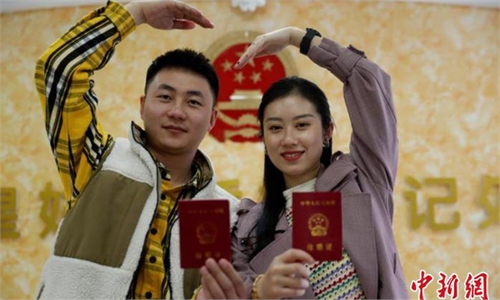
A couple poses on a "Buddha's hand" built on a cliff in Yueyang, Central China's Hunan Province on Thursday. May 20, or "520 day," is regarded as another Valentine's Day in China, as "520" sounds similar to "I love you", or "Wo Ai Ni", in Chinese. Photo:VCG
A man in Central China's Henan Province reportedly sued a local insurance company that denied to pay him out his "love insurance" he purchased years before.The man, surnamed Xu, bought three years of "love insurance" in November 2016. The insurance regulated that, if Xu could preserve the marriage with his wife for at least three years, Xu could receive some 23,000 yuan ($3,594.9) from the insurance company when the insurance expired in November 2019, local media Henan Business Daily reported on Tuesday.
But Xu didn't receive the payment after the insurance expired. He then prosecuted the company after it failed to communicate with him, according to Henan Business Daily.
The insurance company said in court that Xu's marriage had ended, arguing that Xu and his wife had been to court for divorce proceedings in 2018. But staffers from the local marriage registration office said the couple didn't appeal after the court refused to allow them to divorce that year. As such, Xu was still married to his wife.
The court later ruled that the insurance company should pay out Xu's claim.
Xu spent nearly 20,000 yuan on the insurance, showed a photo of his insurance certificate published by Henan Business Daily.
First emerging in the Chinese market around 2015, the eye-grabbing "love insurance" once attracted some 20-something clients with a publicity stunt that said customers could "get paid if their relationship (or marriage) with the same person lasts longer than three years," the Global Times reporter found.
"Love insurance" payments varied at different insurance providers, but included money, diamonds, jewelry, or more romantic items such as 10,000 roses.
Despite it becoming a trending gift during Valentine's Day in 2016, the product gradually withdrew from the Chinese market in the following two years, after the China Insurance Regulatory Commission (CIRC) banned insurance companies from providing products with "insurance events causing no actual harm to the insured" in 2017, media outlet Daily Express reported in November 2019.
Global Times


